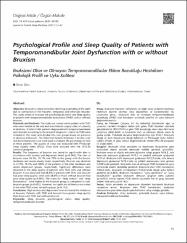Psychological Profile and Sleep Quality of Patients with Temporomandibular Joint Dysfunction with or without Bruxism
Özet
Objective: Bruxism is characterised by clenching or grinding of the teeth due to contraction of the masseter, temporalis and other jaw muscles. This study aimed to evaluate the psychological profile and sleep quality of patients with temporomandibular dysfunction (TMD) with or without bruxism. Materials and Methods: The study was carried out in patients with TMD who were treated at the oral and maxillofacial surgery clinic of a faculty of dentistry. A total of 464 patients diagnosed with temporomandibular joint disorder according to the research diagnostic criteria for TMD were included in the study and divided into two groups based on presence or absence of bruxism. The State-trait Anxiety Inventory-T anxiety scale and Beck Depression scale were used to evaluate the psychological state of these patients. The quality of sleep was evaluated with Pittsburgh Sleep Quality index (PSQI). Data were analysed with the SPSS-20 statistical program. Results: The frequency of bruxism was found to significantly alter in accordance with anxiety and depression levels (p<0.005). The rates of bruxism were 58.3%, 70.1% and 79% in the group with the lowest, moderate and severe anxiety levels, respectively. Bruxism was observed in 72.9%, 78.5% and 100% of the patients in the mild, moderate and severe depression groups, respectively. Significant differences were observed in the sleep quality of patients with TMD with and without bruxism. It was observed that 68.6% of patients with TMD and bruxism had poor sleep quality, while only 58.6% of those without bruxism had poor sleep quality (p<0.005). The scores for "sleep latency'' and "sleep disturbances'' were higher in the bruxism group as compared to nonbruxism group (p<0.005). However, no significant difference was noted in the total PSQI scores for both groups (p=0.145). Conclusion: High anxiety and depression levels increased the incidence of bruxism. Patients with TMD and bruxism have poorer sleep quality than those with TMD but without bruxism.
















